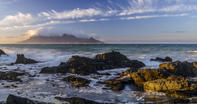Bloubergstrand Fast Fact
As Southern Africa began to be colonised by the Europeans, Bloubergstrand also came under the control of various other powers, no longer occupied by the traditional tribes (who were enslaved, killed or moved by the colonisers in a series of sometimes-bloody encounters).

In short, had the British not taken the Cape in 1806, South Africa would likely be a French speaking country and possibly the first democratic republic in the world. As a result of the sad history of the area, there are a number of monuments and historical attractions in Bloubergstrand to be explored by visitors.
Blaauwberg Struggle
The Battle of Blaauwberg was the first major military skirmish in South African history. At their first foray at the Cape, things in Europe quietened down and the British left Cape Town to the Dutch and their French allies once more. But by 1803, England and France were at each other again, and the Cape appeared on their respective strategic maps. At the time, there was already a small French force at the Cape,namely bolstering Lieutenant-General Janssens' Liquorice-All-Sorts army.
To counter this, the British sent one of their biggest war fleets ever to the south. Anchoring off the reef in Blouberg Bay, just north of Cape Town, they scuttled one of their vessels on the reef to increase the breakwater effect for the forthcoming landing.
Just imagine the surprise for the 1 394 Verenigde Oostindische Compagnie soldiers and French marines, when they realised the size of the force facing them - 60 warships with 6500 troops! The 'war' was marked by a few small skirmishes from 6 to 10 January 1806, but the Cape force was so outnumbered they did more running than fighting. Peace was signed in the shade of a milkwood tree (long gone) on the very hot afternoon of 10 January at Woodstock Beach.
Siege of Blouberg
One would have thought that Paul Kruger's Zuid-Afrikaansche Republiek government had enough warmongering on their hands in 1894 with the pesky British, the uitlanders ('foreigners'), Griquas and who knew what else. But then in May, they went and declared war on the hapless (and rather puny, in military terms) Hananwa tribe under Chief Leboho, who lived on the edge of lush forests around the base of the Blouberg.
A massive quartzitic outlier to the west of the main Soutpansberg range in what is today Limpopo. While four burgher commandos, under the overall command of General Piet Joubert, camped around its base, the entire Hananwa clan fled to the summit. The Boers laid siege to the mountain, with artillery bombarding it (even using pepper-loaded shells).
Eventually the burghers stormed not an inconsiderable task, as any mountaineer who knows it will attest. On 31 July the Hananwa chief surrendered. He was set free again when the British captured Pretoria a few years later. He died peacefully in 1939, but the people of the Blouberg area have never forgotten the siege.
The Great Gale of 1865
In the era of sailing ships, gale-force winds were perilous for all vessels anchored in Table Bay. The Great Gale of 1865 tore 16 ships from their anchors and washed them onto the shore, while 7 sank. A similar fate had befallen De Jonge Thomas nearly a century earlier, but we remember that shipwreck for a very special reason. When dawn broke it must have seemed like the bucking, creaking ship was being visited by the forces of hell.
The captain fired some cannon shots to alert people on shore that they might soon need help - and soon they did. The ship tore free from its anchor, was dashed onto a shallow reef near the mouth of the Salt River and cracked in half. A platoon of soldiers on the beach could do little, but then a man on a black horse rode up, took a rope and ploughed into the churning surf. Seven times he swam his horse out to the wreck, each time dragging back two sailors.
Exhausted but resolute, he turned for an eighth time, but this time several desperate, drowning men grabbed at rider and horse and all of them perished in the wild sea. The brave rider's name was, of course, Wolraad Woltemade. A Dutch ship and later a bravery award were named in his honour.
By David Bristow Cape Town, located in the Western Cape Province, is referred to by many as the Gateway to South Africa. No other city in the world can compa...
Cape Town, located in the Western Cape Province, is referred to by many as the Gateway to South Africa. No other city in the world can compa...